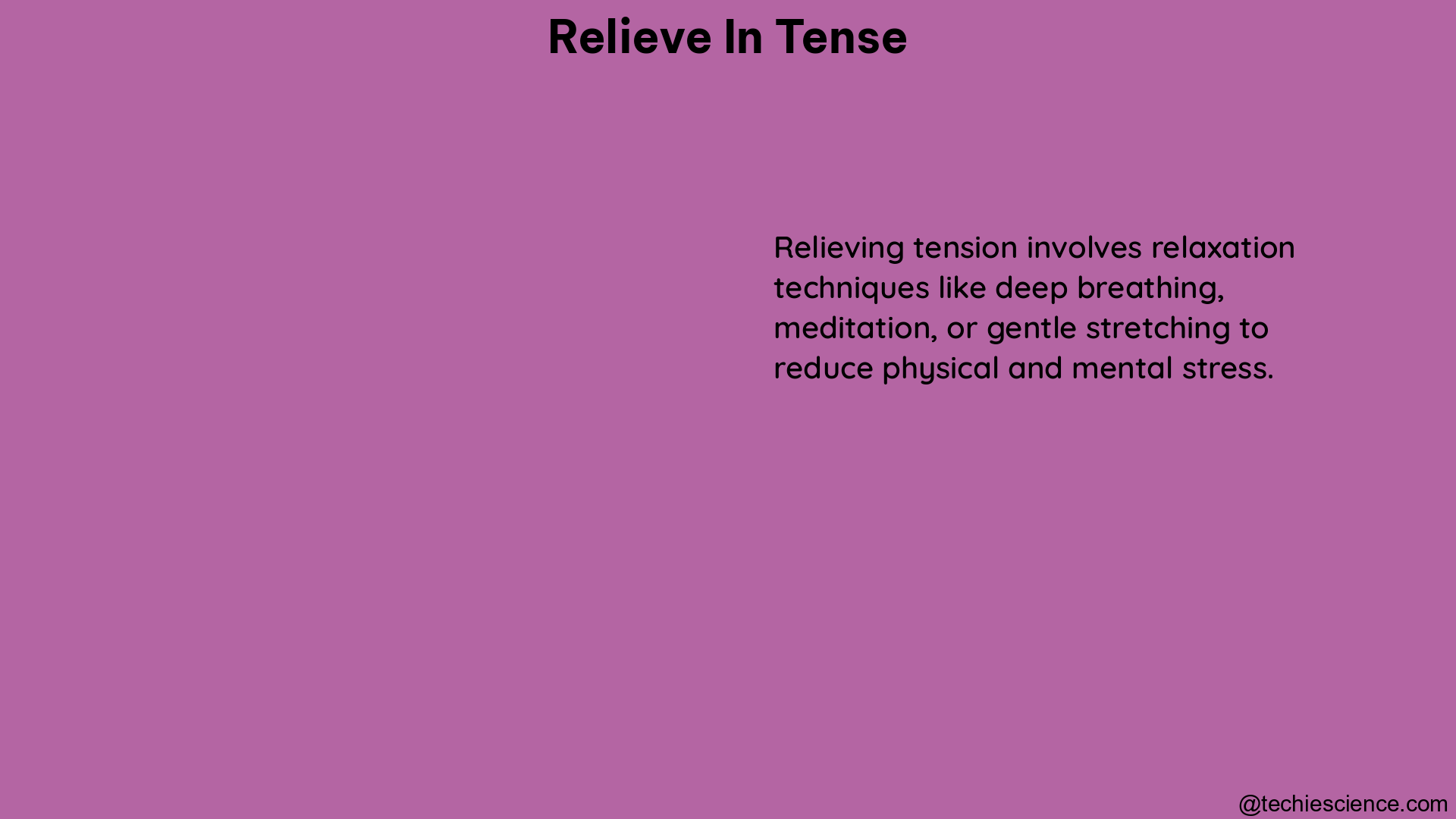The verb “relieve” is a regular verb in English, and its conjugation follows a standard pattern. In this comprehensive guide, we will delve into the various tenses of “relieve” with detailed explanations and examples, providing a valuable resource for English language learners and enthusiasts.
Present Tense
Indicative Present
The indicative present tense of “relieve” is used to express general or habitual actions in the present time.
| Subject | Verb Form |
|---|---|
| I | relieve |
| You | relieve |
| He/She/It | relieves |
| We | relieve |
| You | relieve |
| They | relieve |
Examples:
– “I relieve stress by practicing yoga every day.”
– “She relieves her headache by taking a nap.”
– “We relieve our workload by delegating tasks to the team.”
Past Tense

Indicative Past
The indicative past tense of “relieve” is used to express completed actions in the past.
| Subject | Verb Form |
|---|---|
| I | relieved |
| You | relieved |
| He/She/It | relieved |
| We | relieved |
| You | relieved |
| They | relieved |
Examples:
– “I relieved my friend’s anxiety by listening to her concerns.”
– “The doctor relieved the patient’s pain with medication.”
– “They relieved the traffic congestion by implementing a new road system.”
Present Continuous Tense
Indicative Present Continuous
The indicative present continuous tense of “relieve” is used to express ongoing actions in the present time.
| Subject | Verb Form |
|---|---|
| I | am relieving |
| You | are relieving |
| He/She/It | is relieving |
| We | are relieving |
| You | are relieving |
| They | are relieving |
Examples:
– “I am relieving my workload by delegating tasks to my team.”
– “She is relieving her stress by practicing meditation.”
– “They are relieving the situation by negotiating a compromise.”
Past Continuous Tense
Indicative Past Continuous
The indicative past continuous tense of “relieve” is used to express ongoing actions in the past.
| Subject | Verb Form |
|---|---|
| I | was relieving |
| You | were relieving |
| He/She/It | was relieving |
| We | were relieving |
| You | were relieving |
| They | were relieving |
Examples:
– “I was relieving my headache by taking a break from work.”
– “She was relieving her anxiety by talking to a therapist.”
– “They were relieving the traffic congestion by implementing a new road system.”
Present Perfect Tense
Indicative Present Perfect
The indicative present perfect tense of “relieve” is used to express actions that have been completed in the past and have a connection to the present.
| Subject | Verb Form |
|---|---|
| I | have relieved |
| You | have relieved |
| He/She/It | has relieved |
| We | have relieved |
| You | have relieved |
| They | have relieved |
Examples:
– “I have relieved my workload by delegating tasks to my team.”
– “She has relieved her stress by practicing meditation regularly.”
– “They have relieved the situation by negotiating a compromise.”
Past Perfect Tense
Indicative Past Perfect
The indicative past perfect tense of “relieve” is used to express actions that occurred before another action in the past.
| Subject | Verb Form |
|---|---|
| I | had relieved |
| You | had relieved |
| He/She/It | had relieved |
| We | had relieved |
| You | had relieved |
| They | had relieved |
Examples:
– “I had relieved my friend’s anxiety by listening to her concerns before she left.”
– “The doctor had relieved the patient’s pain with medication before the surgery.”
– “They had relieved the traffic congestion by implementing a new road system before the event.”
Future Tense
Indicative Future
The indicative future tense of “relieve” is used to express actions that will occur in the future.
| Subject | Verb Form |
|---|---|
| I | will relieve |
| You | will relieve |
| He/She/It | will relieve |
| We | will relieve |
| You | will relieve |
| They | will relieve |
Examples:
– “I will relieve my friend’s anxiety by listening to her concerns.”
– “She will relieve her stress by practicing meditation.”
– “They will relieve the traffic congestion by implementing a new road system.”
Future Continuous Tense
Indicative Future Continuous
The indicative future continuous tense of “relieve” is used to express ongoing actions in the future.
| Subject | Verb Form |
|---|---|
| I | will be relieving |
| You | will be relieving |
| He/She/It | will be relieving |
| We | will be relieving |
| You | will be relieving |
| They | will be relieving |
Examples:
– “I will be relieving my workload by delegating tasks to my team next week.”
– “She will be relieving her stress by practicing meditation every day.”
– “They will be relieving the traffic congestion by implementing a new road system over the next few months.”
Future Perfect Tense
Indicative Future Perfect
The indicative future perfect tense of “relieve” is used to express actions that will be completed by a specific point in the future.
| Subject | Verb Form |
|---|---|
| I | will have relieved |
| You | will have relieved |
| He/She/It | will have relieved |
| We | will have relieved |
| You | will have relieved |
| They | will have relieved |
Examples:
– “I will have relieved my workload by delegating tasks to my team by the end of the month.”
– “She will have relieved her stress by practicing meditation regularly before the big event.”
– “They will have relieved the traffic congestion by implementing a new road system before the holiday season.”
References
- Reverso Conjugator English. (n.d.). Conjugate verb relieve. Retrieved from https://conjugator.reverso.net/conjugation-english-verb-relieve.html
- PONS. (n.d.). Conjugation of relieve – English verb. Retrieved from https://en.pons.com/verb-tables/english/relieve
- Bab.la. (n.d.). How to conjugate “to relieve” in English? Retrieved from https://en.bab.la/conjugation/english/relieve
- WordReference.com. (n.d.). Conjugation of relieve. Retrieved from https://www.wordreference.com/conj/enverbs.aspx?v=relieve
- The Conjugator. (n.d.). English verb conjugation TO RELIEVE. Retrieved from https://www.theconjugator.com/english/verb/to%2Brelieve.html

Hi…..I’m a graduate with a Bachelor’s degree in English Literature. I wish to do a Masters in the same field someday and continue my career in Academia.
Let’s connect through LinkedIn: